
Author’s note: Warning that there are HUGE spoilers for the Attack on Titan (anime and manga), as well as for the Last of Us (part 1 and 2)!
All my friends know that I grew up watching anime and playing video games.
And I’m happy to see that, over the past few years, it’s become more and more socially acceptable — with the anime industry growing at double digit CAGR and the gaming industry exploding with mobile, free-to-play, and professional competitions.
To the point where NBA players are livestreaming their Fortnite matches, and Studio Ghibli films are revered as some of the best animation ever.
It didn’t always use to be the case. Playing videos and watching Japanese cartoons used to be the hallmark signs of being a nerd or a “weeb”.
I remember tearfully admitting my darkest secret to my then-girlfriend in high school that I still watched anime as a 16-year-old and she replied with an emphatic “that it?”
Now, as anime and video games become more mainstream, mangakas and game studios are dedicating more attention and resources to the quality of storytelling of the two mediums — to the point of drawing intense critical praise.
The Rise of Naughty Dog
For video games, there’s arguably no bigger darling for creating cinematic experiences than Santa Monica-based Naughty Dog.

Naughty Dog turned the whole concept of “video game” upside down with its release of Uncharted: Drake’s Fortune on the Playstation 3 in 2007.
With its beautiful graphics, smooth animations, quippy dialogue, and beautifully choreographed action scenes, the game felt more like a summer blockbuster Indiana Jones-esque movie than a run-of-the-mill shooter video game.
Naughty Dog was praised for the quality of the game’s script, the deep and complex character development, and the pain-staking hours they dedicated with motion capture technology to accurately depict human emotion.
And each subsequent sequel of the Uncharted series only improved on its predecessor in every dimension. The graphics were more stunning, the story even more compelling, the characters (and their flaws) evoking even more sympathy and respect.
Naughty Dog’s reputation hit a peak with its release of a new IP The Last of Us in 2013 — with some critics today still claiming it the best video game ever made.
Set in a post-apocalyptic United States where society has crumbled due to an outbreak of human-brain-eating fungi called Cordyceps (a real thing IRL, just not for humans), we follow Joel and Ellie, a patchwork father-daughter duo, as they cross the country in search of the Fireflies, an organized militant group that seeks to find a cure for the Cordyceps.
What starts off as a typical zombie plot line a la Will Smith’s I Am Legend slowly unravels into a deep, harrowing tale of suffering, loss, and the beauty within it all.
While the “plot” is a save-the-world-from-zombies mission, the real “story” is the growing relationship between Joel, a man who lost his reason to live after his daughter dies from the initial Cordyceps outbreak, and Ellie, a teenage girl who was born into a cruel world and wants to sacrifice her life for some sense of purpose.
And in the backdrop of this blossoming father-daughter relationship, we see that the real antagonist is not a fungus, but the cruelty of humanity as factions of people torture, kill, and eat one another in the name of survival.
“The Last of Us has an unparalleled understanding of what it means to be human, of what it means to love and to lose. There is no right or wrong when it comes to protecting the ones we care about — only shades of grey” — Vice
The Shock of The Last of Us 2
Given the success of The Last of Us 1 and the Uncharted franchise, it only stands to reason that — in the 7 year hiatus between The Last of Us and the release of its sequel in 2020 — the hype for The Last of Us Part 2 ballooned to unsustainable levels.
Public consensus was it was either going to be the greatest game on earth or a complete disappointment — nothing in between.
So when the first wave of critic and gamer reviews came out for the game in late 2020, the world was stunned to see that it was not the greatest game on earth or a complete disappointment.
It was both.
Receiving near unanimous praise from critics but a head scratching 5.7/10 from users, The Last of Us 2 quickly became the most divisive and controversial game in recent memory.


As a casual fan deciding whether to purchase the game and reading through the mountain of polarized reviews, I was reduced to the Ant Man meme from Avengers: Endgame.

My curiosity was sufficiently piqued so I bit the bullet and played through the game to form my own opinion.
And after the ~20 hours of gameplay, I came out of that experience with a lot of amazing things to say about the game.
The themes of the story were incredibly poignant; a tale about revenge, moral ambiguity, and forgiveness. The motion capture is the best in the industry — with characters making the most expressive faces I’ve ever seen in a video game. The story had incredibly strong female and LGBTQ+ leads that didn’t feel forced.
But the core part of the narrative experience was hollow. The characters, once incredibly vibrant and nuanced in the original, were reduced to one-dimensional over-simplified personality traits. Some motivations made little sense from an internal logic perspective and seemed to only exist to advance the plot forward.
Instead of directly going into detail on why I was so disappointed in the game, I want to compare and contrast it with an equally as critically acclaimed manga Attack on Titan, which tells a very comparable story to TLOU2 but does it with so much more grace.
The Parallels with Attack on Titan
On the surface, Attack on Titan touches on the exact same themes as The Last of Us.
Set in a post-apocalyptic world overrun by titans — oversized monsters that eat humans — in which humans are relegated to hiding in walled cities slowly awaiting their deaths, we follow teenager Eren Jaeger and his friends as they join the Survey Corps, an army that seeks to stop the titans and save humanity.

Again, what’s starts off as a fun, run-of-the-mill action anime premise turns into a beautiful lesson of friendship, prejudice, and the cruelty of humankind.
Like Joel and Ellie from TLOU, Eren and his friends have suffered — their parents dying in a coordinated titan attack when the main characters were 10 years old.
Like TLOU, the focus of the story in AOT slowly turns its attention to the fragility of humanity — as the humans within the wall cities turn on each other and even wage civil war.
And like the first TLOU, AOT is consistently ranked the best anime ever since it came out in 2013.
Both Attack on Titan and The Last of Us 2 have the same overall message, but the delivery could not have been more different.
Whereas the characters in TLOU2 took a backseat to the writers’ message, those in AOT actively communicated the message through their actions and experiences.
There are three especially salient messages— or themes rather — that both stories impress on the viewers that I’m going to use as a framework for why Attack on Titan receives universal praise and why The Last of Us 2 is so controversial.
- Morality is gray and subjective
- The cycle of hatred is futile
- All decisions have gravity
The Subjectivity of Morality
The biggest, mostly widely discussed, and most controversial moment in The Last of Us 2 is the perspective shift halfway through the single-player campaign.
Up until that moment, you mainly play as Ellie, Joel’s surrogate daughter and the second main character of the original.
In other words, someone who we, as players, know and love very well.
So it’s no surprise that, after all that we’ve been through with Ellie, we understand her absolute hatred for Abby, the woman who kills Joel in the beginning hours of the game.
In Game of Thrones a la Ned Stark fashion, Naughty Dog chose to kill off the main character of the original game — someone that the fandom loved dearly as a father figure to Ellie and a beautifully written, flawed character.

So we cheer for Ellie as she hastily packs her things and journeys to Seattle to locate and kill Abby.
And we cheer a little less when Ellie goes on a self-destructive rampage, killing all of Abby’s loved ones one-by-one in search for revenge.
But nonetheless we still cheer, because we know Ellie, we know her story, and we know that she’s in the right.
Actions have consequences, Abby.
The story culminates in a showdown between Ellie and Abby in an abandoned theatre — where both women have killed each other’s close friends in an increasingly brutal fashion and the only satisfactory outcome for either woman is death.
And moments before the final encounter…
We flip to Abby’s perspective. Three days before the showdown.
What the hell?
We’re essentially blue balled from knowing the outcome of the climax and are forced to play ~10 hours in the shoes of the killer of our beloved Joel in the days leading up to the climax.
And in the process, we learn about Abby.
We learn that her father was killed by Joel in the original game (more on this later), and that’s why she so desperately tracked down and killed Joel in the beginning moments of the sequel.
We learn that she’s in a love triangle with her former lover Owen and her friend Mel. We learn that she’s mentally drained from the inter-faction violence that has engulfed Seattle.

And the entire time playing as Abby, we stared at our watches — waiting for the moment to play as Ellie again.
Because we didn’t give a shit about Abby.
We didn’t care that “she’s a human too”— even though we know that the writers at Naughty Dog desperately want us to have that takeaway. That we’re all humans, that we’re all the heroes of our own story, that right and wrong is subjective based on the narrator.
“Caring about Abby is an uphill battle — you feel like you’re being preached at as you play her” — VGS Youtuber
I spent every second playing Abby either rolling my eyes or holding back abject disgust. Sometimes, I’d let go of my controller just to watch her die over and over again.
Because to me, Abby isn’t just another human — she’s the killer of Joel and other major characters that I’ve grown to love.
I have to hate her.
And every vulnerable and heartfelt moment I shared with Abby felt forced. She didn’t actually love Owen, nor did she actually want to live a peaceful life. These were just plot points that I was fed to feel sympathy for a “villain”.
Because Abby isn’t a character, she’s a hollow symbol of gray morality.
Attack on Titan also had an equally big and controversial moment in the story— a perspective change from the main characters to the antagonists.
Halfway through season 2, it’s revealed that Reiner and Bertholdt, two major characters in the central cast, are the Armored Titan and Colossal Titan respectively — the “enemies of humanity” that destroyed Eren’s hometown in the pilot episode and, as a result, killed Eren’s mother.
Absolute craziness ensues in which Eren and the Survey Corp battle the two Titans, resulting Bertholdt losing his life and Reiner narrowly escaping to his home overseas.
The entire time, the audience — along with Eren — is shocked at the reveal (Reiner and Bertholdt fought alongside the Survey Corp for years! They battled titans together!) and furious at the two antagonists (How could they befriend Eren, knowing that they killed his mom?).
After the battle, we’re treated to a four-year time skip and are now following Reiner’s perspective as a 19-year-old.
I remember the fandom being furious at this perspective shift. Why should we care about Reiner after all the pain he’s caused the main cast?
Here, we learn about Reiner’s motivations for invading Shiganshina in the first place and starting a chain tragic events.
We learned that humanity has not perished by titans. Reiner lives in a country called Marley who has enslaved a race of people called Eldians. This country neighbors an island called Paradis — which our main cast mistakenly thinks is entire world. Paradis is also inhabited by Eldians — called “Walldians” for simplicity because they lived in walled cities.
Eldians have been enslaved because they used to be a fearsome empire that terrorized and enslaved Marleyans. Eldians were able to do so because they are the only human race who can turn in titans.
When Marley overthrew the Eldian Empire, the majority of Eldians fleed to Paradis to escape persecution. The remaining Eldians were enslaved — to be used as weapons for the Marleyan army.
Reiner is an Eldian. He — along with Bertholdt — lived in a ghetto and were persecuted their entire lives. Their only chance of becoming “honorary Marleyans” was to join the army at a young age and volunteer to become titans and invade Paradis.
Reiner grew up with a single mom and found out that his dad is Marleyan who can’t be with him unless he succeeds in the invasion and — in his mind — becomes a Marleyan.

In that moment, Reiner — a character that I once hated so passionately — becomes my favorite in the whole series.
Given that the plot points are so similar, why was Attack of Titan’s perspective switch so widely commended compared to that of The Last of Us 2?
Three reasons: (1) recontextualization of the original plot, (2) nuanced character motivations, and (3) remorse.
Recontextualization of the original plot
Throughout the entire plot up until that point, Attack on Titan was shrouded in mystery. The audience learned along with the main cast — as they slowly grasped questions like “Is humanity really gone?” and “what’s the origin of the titans?”
Bringing in an informed narrator like Reiner gave the audience the much-needed exposition dump that propelled the the plot forward.
Previous scenes that were originally confusing (e.g., why can that titan talk) suddenly clicked together — a sort of catharsis for viewers.
In contrast, Abby’s perspective in TLOU2 brought no sense of clarity; instead of making the existing world more vibrant, it introduced a new world (e.g., Seattle) that we didn’t care about. Rather than propel the plot forward, Abby’s backstory distracted the the plot away on a side adventure.
Nuanced character motivations
Reiner’s motivations are far more complex than those of Abby’s.
Whereas Abby’s motivation is entirely driven by her anger at the death of her father and desire for revenge, Reiner (and Bertholdt and others) didn’t have those one-dimensional motivations.
At the surface, Reiner didn’t see Walldians as humans. His entire life has been filled with Marleyan propaganda — calling the Walldians “island devils” and using them as a scapegoat for the persecution of Eldians inside Marley. To Reiner, the Walldians were enemies who deserved to be killed.
Then, we factor in the class dynamics of Marley. Eldians were seen as untouchables, and Reiner’s only “out” was to join the army and the mission.
We can even dig deeper and analyze Reiner’s thoughts. Bullied as a child, he grew up lonely and wanting to be loved. He found no solace from his mother who only saw him as a tool to elevate their social status. When given the chance to be reunited with his father (which ends up being a farce that his mother told him to motivate his training) and the opportunity to be viewed as a hero in Marley, he took it.

Remorse
The greatest difference between Reiner and Abby is that Reiner regrets what he did — and Abby doesn’t.
Reiner, after living with Walldians for 5 years, realized that they weren’t devils at all — just humans.
This realization, along with firsthand witnessing the pain and suffering that he caused from the destruction of the wall, caused his mental health to deteriorate — as he was unable to handle the guilt of his actions.
At first, he develops Dissociative Identity Disorder (DID) in order to hide knowledge and pain. He creates a new personality that is a kind, older brother figure to the other members of the Survey Corp — including Eren. This is the character that the audience first meets and loves through Season 1 and halfway through Season 2.

Upon his disgraced return home, Reiner learns to accept the burden of his actions and becomes suicidal — on the brink of killing himself in multiple occasions.

The Futility of the Cycle of Hatred
The Last of Us 2 repeatedly hit us over the head with the lesson that revenge and hatred will never satisfy us. The cycle is never ending.
Joel kills Abby’s father. Abby kills Joel, who’s Ellie’s surrogate father. Ellie kills Abby’s friends. Abby kills Ellie’s friends. Ellie kills Abby’s lover. Abby almost returns the favor.
“Before you embark on a journey of revenge, dig two graves” — Confucius
And at every step, Ellie becomes more morally corrupt, more self destructive.
Ellie tortures one of Abby’s friends to give up her location. She later kills a pregnant woman who protected Abby. She razes Seattle to the ground, leaving countless bodies in her wake as she searches for Abby.
We, as players, don’t feel good with directing Ellie on this rampage. We ask, where does this end, if ever?
But it does end.
At the theatre, Abby beats down Ellie and brings a knife to the throat of Dina, Ellie’s love interest. Only after Lev (Abby’s surrogate brother) begs Abby to let her revenge go, does Abby spare Dina’s life.
Abby, mentally exhausted from the violence in Seattle, realizes that there’s more to life than killing and that she wants to live for Lev.

She runs away with Lev — only to be chased down again by Ellie in Southern California. In a final confrontation, in which both women are emaciated and injured, Ellie gains the upper hand and is drowning Abby in the fog-ridden seashore.
However, Ellie has a flashback to a good memory that she and Joel shared and this gets her mind racing. What if Joel could see her now, in her sorry state?
Screenrant said it better than I could:
“Ellie likely realized that this isn’t what Joel would’ve wanted for her… When Ellie is beating Abby, the look on her face implies that it doesn’t feel as satisfying as she had expected it to. Through that, not only did Ellie realize that this wasn’t going to bring back Joel (or honor his memory in any way) but it would only be contributing to the cycle of violence. Abby killed Joel because he killed her father. Who would be killed next if Ellie was to kill Abby?” — Screenrant
So Ellie lets her go. Abbie drags a half-dead Lev into a boat and drifts away.
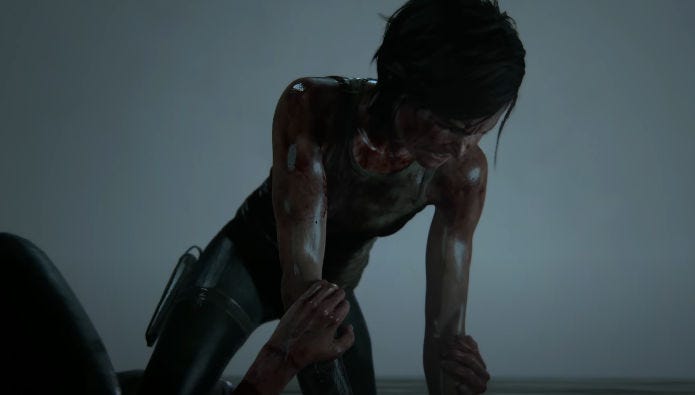
And this moment — which is supposed to be the literary climax of the story — ends in such a unsatisfying note.
Both moments, in which Abby and Ellie spare each others’ lives, left gamers with such a hollow feeling. Not because we’re bloodthirsty animals, hellbent on revenge.
But because there was no clear reason for Abby and Ellie to stop, other than because Naughty Dog wanted to tell us that “revenge is bad”.
Abby forgives Ellie because Lev told her to — only for Ellie to track her down and nearly beat her to death. Ellie forgives Abby because of a good memory with Joel — even though Abby was the one who killed Joel and even after Ellie tracks her down the West Coast to enact revenge.
A heavy topic like forgiveness was treated like a deus ex machina that saves our characters from any real internal dialogue.
Viewers don’t want a convenient ending; there’s no plot device that will magically remedy relationships.
It’s like the Superman v. Batman scene that got memed to death where Batman spares Superman’s life because their mothers share the same name.
Compare this with Attack on Titan: a similar cycle of never-ending hate.
The Eldian Empire kills Marleyans. Marley enslaves Eldians, including Reiner’s ancestors. Reiner kills Walldians, including Eren’s mother. Eren kills Marleyans in retaliation. Gabi, a Marleyan titan trainee, kills Sasha, Eren’s friend. Niccolo, Sasha’s love interest, attempts to kill Gabi, who is saved by Falco, a boy that loves Gabi.
It’s a multiplicative effect that sucks everyone into the vortex of revenge. Generations of hatred perpetrated again and again by its descendants.
However, the thing that Attack on Titan teaches us is that it’s hard to not hate, hard to not seek revenge. It’s human nature to yearn for equity in the world.
A life for a life.
And that’s precisely what we see — people struggling to be “good” but failing time and time again. Because it’s scary to trust the “enemy”.
There’s no better example of this then Kaya, a 10-year-old girl in Paradis who befriends Gabi, a Marleyan-Eldian titan warrior.
Kaya knows that Gabi is the “enemy” but still tries to help her meet up with another Marleyan so that she return home. Kaya tries being kind to Gabi, role modeling after her surrogate sister Sasha who dedicated her life to saving others.

However, Kaya learns the truth that Gabi was the one who shot and killed Sasha, as an act of revenge against Eren who destroyed her hometown in Marley. Kaya quickly turns against her and draws a knife — citing that Gabi must pay for killing her sister.
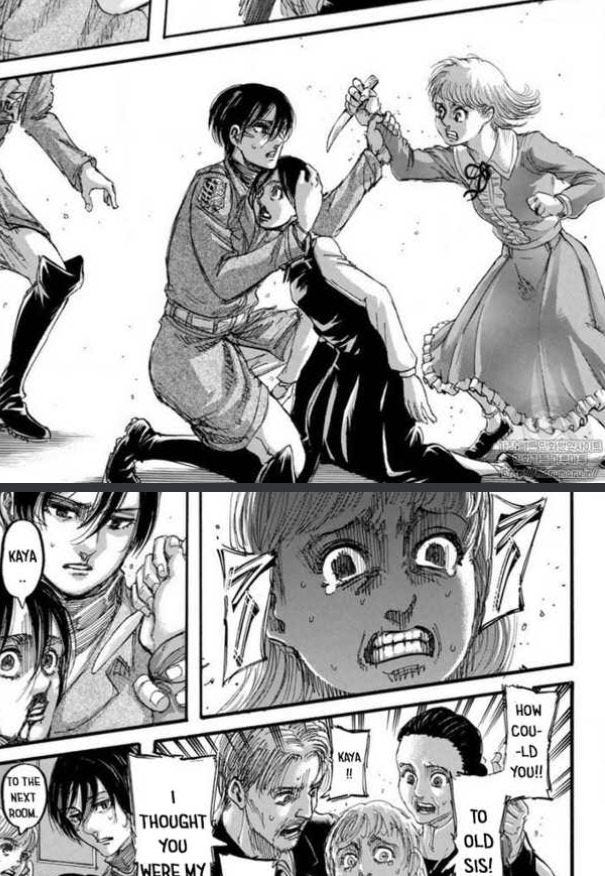
Ending the cycle of hatred is work, and it takes time. Change is hard and it doesn’t happen when it’s convenient.
Even as the world is about to end, the remaining Marleyans and Walldians can’t come together to stop Eren from destroying the planet.


And it’s not all nihilistic despair in the Attack on Titan universe. There are lights in the darkness that show us that forgiveness is possible.


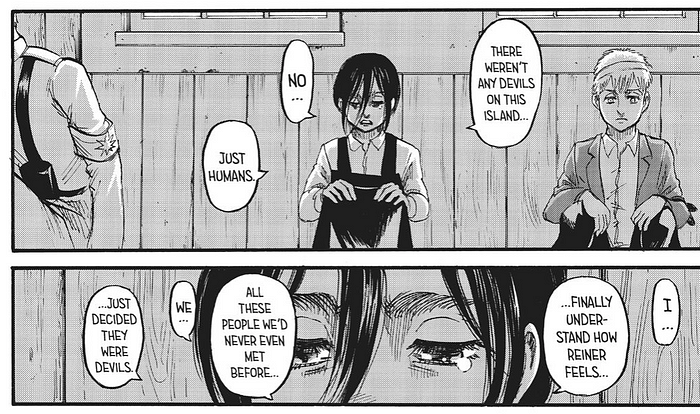
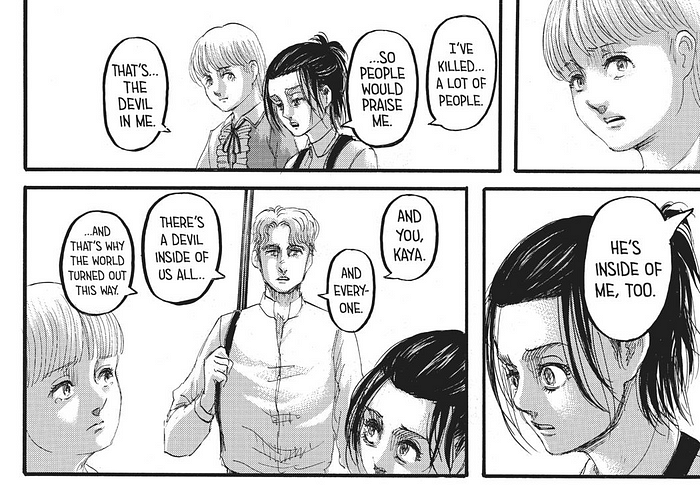
Attack on Titan depicts real life. Ending hatred is not a split second decision that’s convenient for a story.
And that’s what makes Attack on Titan’s moral so much stronger. It’s not a hackneyed platitude — it’s a real goal that takes work to obtain.
The Weight of Decisions
The biggest decision in The Last of Us universe is not Abby’s decision to kill Joel, nor Ellie’s decision to spare Abby — again, these choices have little weight and reasoning to them.
The biggest decision was in the original The Last of Us, where in the final moments of the story, Joel chooses Ellie over humanity.
Some context, Ellie is found to be immune to the Cordyceps fungi, and thus Joel and Ellie travel across the country in search of the Fireflies’ doctors who can replicate her immunity and save the world from the fungi infection.

When the two finally find the Fireflies, Joel learns that the doctors would have to kill Ellie — in order to dissect her body and replicate a cure.
While Ellie doesn’t know that the procedure will kill her, the audience can infer, from knowing her as a character, that she wouldn’t mind sacrificing her small life to save humanity.
However, Joel cannot live with that outcome; over the course of the game, Joel has come to realize that he needs Ellie — she saved him from his depression. She’s the replacement daughter that he thought he had lost in the initial outbreak.
So, in the most heartbreaking scene of the original, Joel breaks into the hospital and kills the Firefly doctor — Abby’s dad — who was operating on Ellie.
Joel grabs an unconscious Ellie from the operating table, escapes the hospital, and drives away — never to return. Ellie awakens to a half-assed explanation from Joel that the procedure was a hoax.
In the last scene of the original, Ellie pleads to Joel to tell him the truth, in which Joel doubles down on his answer — it was a sham. Incredulous, Ellie narrows her eyes, and the viewers can tell that their relationship is permanently altered.
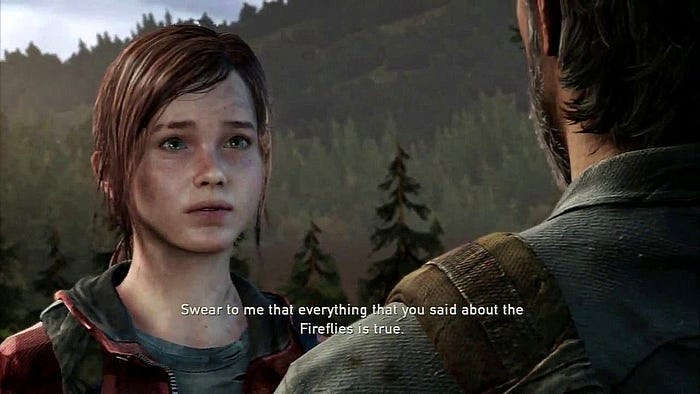
THIS. This is what I wanted to play out in the sequel: the ramifications of Joel’s decision on him, Ellie, and their relationship.
Does Joel feel remorse for what he did? Can Ellie forgive Joel for taking away her life’s meaning? Can they repair their relationship?
Instead, we are given a literary cop out of Joel just dying.
No discussion at all about the gravity of his decision. Joel expressed no remorse for what he did before his death. Ellie’s severed relationship with Joel was replaced with her fond memories of the past.
The most important moment of the series becomes a moot point in 1–2 hours of gameplay.
Let’s contrast this with the most important decision in Attack on Titan, a decision that carries weight throughout the entire series.
The main cast just survived the showdown with Reiner and the other Marleyan-Eldian warriors, effectively killing Bertholdt.
Levi Ackerman, a captain in the Survey Corp, is faced with a choice; he has only one vial of titan serum. Anyone he injects the serum into will effectively be brought back to life, fully health and able to turn into a titan.
Two Survey Corp members are on the brink of death and desperately need the serum. One is Armin, a rising star in the Survey Corp ranks and Eren’s childhood best friend. He sacrificed himself to distract Bertholdt so that Eren can capture him.
The other is Erwin Smith, the man in charge of the Survey Corp, a brilliant military tactician, Levi’s closest friend, and humanity’s symbol for hope — a la Harvey Dent in Dark Knight Rises. Erwin sacrificed himself so that Levi can take down the Beast Titan (an ally of Reiner’s).
Eren pleads with Levi to save Armin, claiming that Armin will be the one to save the world — whereas others want Erwin to live for obvious reasons: the man is the literal symbol of hope for the Walldians.
In the scene now famously dubbed Serumbowl, Levi chooses Armin because he wanted Erwin to rest in peace, no longer having to suffer the pain of life.
The gravity of Levi’s decision greatly impacted the story: both by Erwin’s absence and by Armin’s survivor’s guilt.
Erwin’s Absence
Erwin was the most charismatic character in the Attack on Titan universe. He crafted bold, risky plans that allowed humanity to survive — like capturing the Female Titan (another one of Reiner’s allies) and overthrowing the complacent monarchy.
He was ruthless in his tactics, seeing human sacrifices are necessary evils, but his confidence always brought comfort into the minds of his troops.
With the absence of his leadership, we see his successors struggling with imposter syndrome — unsure where to lead humanity. They second guess themselves and overthink to the point of paralysis.
This leads to dissent in the troops, namely Eren who wants to act quickly against Marley’s impending follow-up act on Paradis.

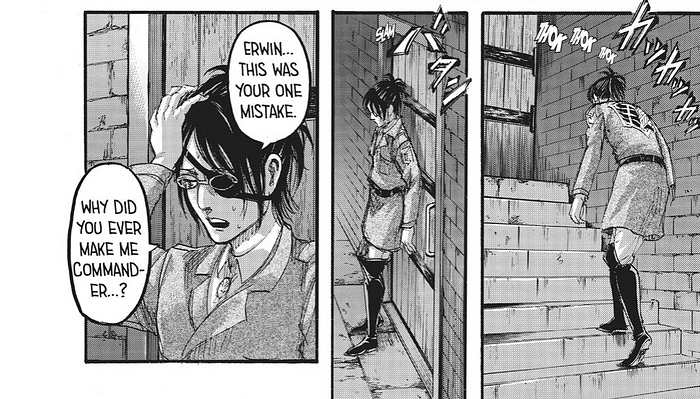
Armin’s Survivor’s Guilt
One thing that Eren didn’t account for in his plea for Armin to be chosen was the immense, torturous survivor’s guilt that Armin would feel.
So terrible that it arguably stunted his ability to solve problems and command a team — something that he was praised for doing before Serumbowl.

After the four-year timeskip, fans were disappointed to see that Armin had matured the least out of the main cast. Like Hange, he constantly measured himself to Erwin’s greatness — hindering his ability to make sound decisions.
It didn’t help that there was still a chorus of people who believed that Erwin should have been chosen over Armin.


As a result of his indecisiveness, Armin ran out of time to prepare for an encounter with the Marleyan army, and Eren had to take drastic measures to compensate.
The fandom likes to posit the question of, what would happen if Erwin were chosen. What he have committed the same mistakes as Hange and Armin, leading to the same disastrous outcome that’s happening right now in the story?
This decision had weight that had rippling effects to the rest of the story. We have to wonder, if Erwin were alive, what he have done better than Hange and successfully stopped Eren’s plan to destroy the world?
There are so many great examples of tough decisions made and their ramifications in the Attack on Titan universe.
In a similar vein to Joel, Historia (Eren’s friend) chose to save Eren’s life over that of humanity — making the choice to save those personally close to her rather than the theoretical “world”.
In return, she realizes that Eren has turned into the villain, hellbent on destroying the world and has to live with that knowledge.

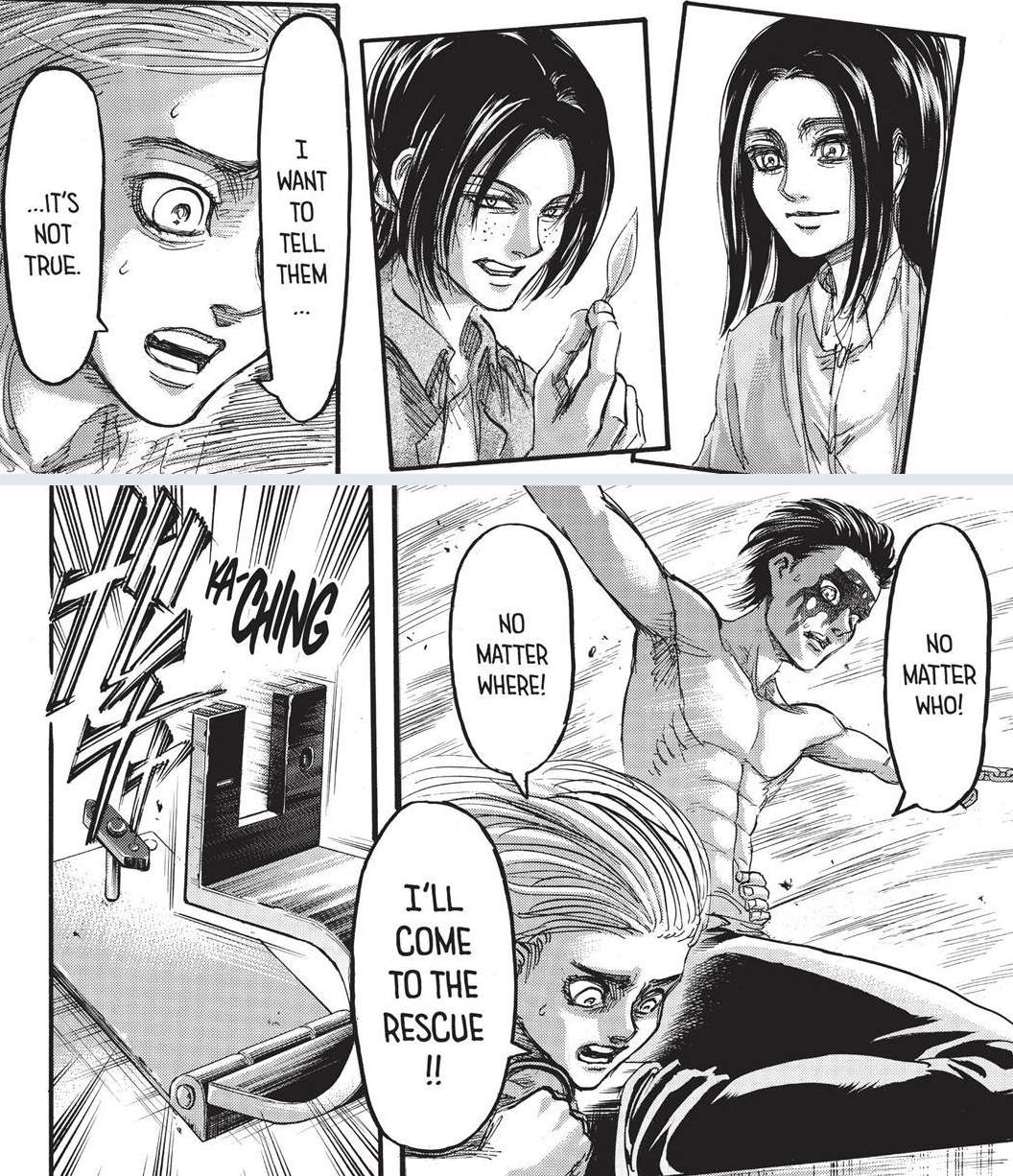

Looking back, it’s easy to see how The Last of Us 2 received so much praise from critics, yet so much disdain from gamers.
On paper, The Last of Us 2 is a beautiful story that teaches us profound lessons about loss, love, and life. However, it was the medium that messed up the impact of it.
Naughty Dog wanted to push the boundaries of the video game medium by telling an incredible story, but in the process, they stripped away the joy of playing a video game. Hence the terrible reviews from people who actually played the game.
Restricting the story — and thus player’s choices — made the story feel inauthentic. The players were watching Naughty Dog’s story, rather than co-creating the story between players and studio alike.
Attack on Titan, however, had the luxury of being a television show, where the audience was beholden to the writers room’s choices.
Maybe that’s why it receives so much praise.
